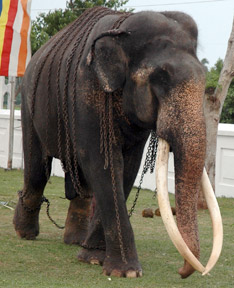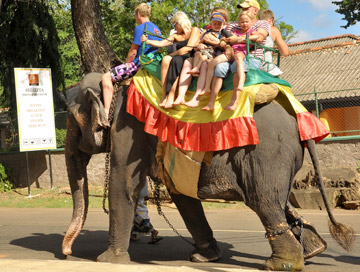|
Temporary Provisions Act in the pipeline:
Microchipping to curb false elephant registrations
By Dhaneshi Yatawara
|
 |
|
Here you seen a manacled
temple elephant? The heavy chains put on him have caused many
injuries. |
In a bid to keep a close tab on the dwindling number of elephants,
legal provisions will be introduced by wildlife authorities to
streamline registering and licensing of tamed elephants. A Temporary
Provisions Act is in the pipeline in addition to on-going investigations
by the Criminal Investigations Department (CID) on allegations of forged
entries being introduced into the existing records of tamed elephants.
The Temporary Provisions Act will be put in place as soon as
short-term measures to address issues that could arise with the
suspension in registering and licensing of tame elephants is found. "The
draft is now with the Attorney Generals Department. After fine tuning,
the Bill will be presented to Parliament," Deputy Minister for Tourism
and Sports Wasantha Senanayake said.
"The CID has acted quite fast. I understand that they intend to go on
site inspection of the elephants in question," he said.
The Act will operate as a temporary measure until the licensing
problem is sorted out. This is to streamline the registering process and
it will only address the licensing and registration problem," he said.
The Deputy Minister said "once the Act is implemented registering and
issuing licenses will be carried out". A few weeks ago, the Deputy
Minister requested the CID to investigate allegations of fraudulent
entries in the existing records of tamed elephants and falsification of
documents which he explained were based on the report compiled by the
Auditor General in 2014. A separate audit which was carried out by the
Auditor General's Department prior to CID investigations, revealed that
20 log entries were doubtful, according to the Deputy Minister.
"The Auditor General clearly states in his report that records of
almost twenty elephants were inconsistent. Some were unsatisfactory and
cannot be accepted," said Senanayake.
The Act will enable entries to be categorized as minor or major
offences. Fines will be imposed or action will be taken accordingly,
Senanayake pointed out. "When I say a major offence , a fine amounting
to millions of rupees will be clamped and the owner can take the
elephant once he pays the fine or the authorities will confiscate the
animal, depending on the circumstances. At times rehabilitating an aged
elephant may not be possible and Pinnawela is crowded. In certain cases
it would be appropriate to return the elephant to its owner if the
elephant has not been mistreated," he said.
 |
| Ven.
Pahiyangala Anandasagara Thera |
 |
| Wasantha
Senanayake |
"We should keep in mind that the number of tamed elephants were a
significant proportion of the present wild elephant population. This was
a matter of concern to the wild gene pool. When tuskers are taken out of
the natural gene pool the problem worsens" he pointed out.
"We will then micro chip the tame elephants with DNA data," he said.
|

AN ELEPHANTINE TORTURE: At what price do we use our elephants to
entertain tourists? as the picture shows this elephant's rear
legs have been tightly chained to prevent the animal from going
away. Carrying such a huge human load would surely have a
telling effect on this poor animal. This picture was captured by
our staff photographer Susantha Wijegunasekera in Sigiriya
recently |
The Wildlife Director General, H.D. Ratnayake said there were ten
cases of illegally owned baby elephants being heard at the Magistrates
Courts. These were following raids carried out by Wildlife officials
during the past year and a half. "Within the last year we took five
young elephants into custody and from January to mid February another
five young elephants were taken into custody," he said.
"We are keen to put microchips to tame elephants as it would be
difficult to substitute elephants according to the whims and fancies of
the owner," he said. The last Sri Lankan elephant kraal reported from
Panamure, with the legend of the alpha male tusker who tried to protect
its herd from torture still depicts the cruel nature of domesticating
wild elephants. Despite this heart-breaking story and advanced legal
framework, capturing of wild elephants specially young ones was reported
as being at its height during the past few years.
A major step towards prevention of illegal capture and regulation of
captive elephants was taken in 1995 with mandatory registration of
captive elephants with the Department of Wildlife Conservation (DWC).
Under the Fauna and Flora Protection Act it is mandatory for elephant
owners to inform the DWC when a female elephant gets pregnant and the
Department has to be informed within seven days of the birth of an
elephant calf.
The latest ruse adopted in the past few years was gangs of poachers
going into the forests and killing the mothers of selected elephants and
the calves are then separated from their mothers. Poachers use
firecrackers and disperse the herd.
In this confusion the calves are caught and taken away to be tamed or
used for the tourist trade, or for ceremonial occasions or kept as a
symbol of prestige.
Elephants being used in peraheras have come under fire from the
public and conservationists. Now the number of elephants used in a
perahera is not only about adding glamour but competing with other
peraheras held in the vicinity where elephant numbers are increased.
There is no concept in Buddhism that elephants should be used in
peraheras. According to Buddhism using elephants is being selfish, said
Ven.Pahiyangala Anandasagara Thera, General Secretary of the National
Sangha Council. Today some Buddhists rear elephants to enhance their
prestige, Anadasagara thero said. "The concept of a perahera is to
worship the noble triple gem. According to historic records the elephant
was included in peraheras quite lately and it has been recorded in the
Kandyan era. Kings had herds of elephants only for transport and war,"
he said.
As the elephants are owned by many temples, how has the National
Sangha Council to convince them against this practise? It is through a
change in public thinking, he said. High powered temples own these
innocent animals and they are backed by powerful people.It is important
to convince the public not to support raising elephants in temples and
using them in religious ceremonies. |

